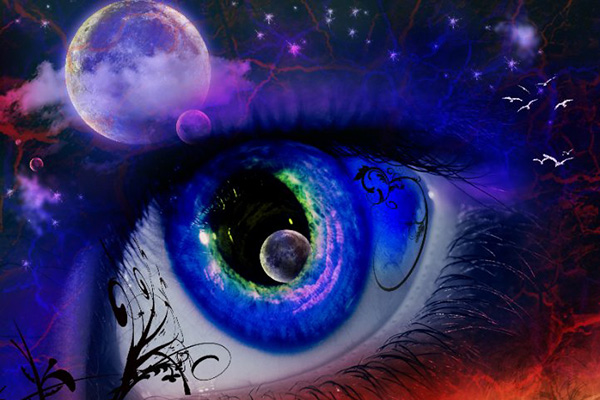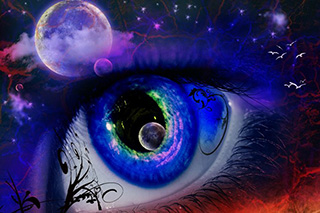Why Do I Keep Having The Same Recurring Dream




Why do we sometimes have the same dream over and over again? Surely a recurring dream is not just a random coincidence or a mind trick?
Correct! Understanding the deeper personal, spiritual and psychic implications of these dreams can indeed give us valuable insight into our subconscious thoughts and emotions, our fate and fortune, and our purpose and destiny. It can also provide us with answers and solutions to life’s challenges and current obstacles you may be facing.
A recurring dream can occur regularly on a daily, weekly, or monthly basis. There is usually very little change in the content of the dream, which makes it all the more strange when it occurs again and again.
These dreams are notable for their persistence and can have a profound impact on our subconscious and emotions, usually leaving a lasting impression and often prompting us to seek their deeper meaning and understanding.
Recurring dreams are a common phenomenon experienced by many people. According to the Sleep Foundation, between 60% and 75% of American adults experience recurring dreams, with more women than men experiencing them. Recurring dreams can be distressing because of their content, and while they can be pleasant, 77% of recurring dreams are negative, upsetting or even deeply disturbing.
Psychological Perspectives
Recurring dreams have long fascinated psychologists and researchers because it offers a unique window into the human psyche. A deeper understanding of these dreams from both Freudian and Jungian perspectives can provide valuable insights into their spiritual significance and symbolical power.
FREUD & JUNG
Sigmund Freud, the father of psychoanalysis, believed that recurring dreams result from unresolved conflicts and repressed desires. According to Freud, these dreams are manifestations of our unconscious thoughts and emotions, often related to early childhood experiences or traumas.
On the other hand, Carl Jung, a renowned Swiss psychiatrist, proposed a more holistic approach to recurring dreams. He viewed them as a way for the unconscious to communicate with the conscious mind, reflecting archetypal symbols and collective human experiences. Jung emphasized the importance of integrating the shadow self and achieving individuation through understanding these recurring motifs and symbols.
EMOTIONAL & MENTAL PROCESSING
Psychchology views the recurring dream as a platform for the unconscious mind to process and reconcile unresolved emotional and mental conflicts. These dreams are said to often highlight recurring themes and symbols that represent underlying psychological concerns, providing an opportunity for introspection and self-discovery.
Emotions such as fear, anxiety, or even joy that surface in recurring dreams can offer valuable insights into our psychological state and underlying emotional patterns. By paying attention to the emotions evoked during these dreams, individuals can gain a deeper understanding of their inner struggles and challenges.
Similarly, the mental processing involved in recurring dreams can shed light on cognitive processes, problem-solving mechanisms, and creative expression. These dreams often present scenarios that require cognitive analysis and decision-making, offering a unique perspective on the individual’s mental faculties and thought patterns.
In essence, recurring dreams are thought to simply reveal the presence of unresolved conflicts or stressors in our lives. It is our brain’s way of processing traumatic events in our lives and teaching us about ourselves and the way we think. The idea is that our brain is essentially forcing us to pay attention in order to deal with the content of the dream.
This perpective is supported by findings that recurrent dreams tend to have negative dream content and are associated with lower psychological well-being. Recurrent dreams are also said to revolve around common themes such as falling, being chased, flying, losing teeth, or being unprepared for an exam. The most common themes are tooth loss and car accidents. Because these dream themes are experienced by many people, psychologists suggest that they may be related to universal experiences and primal emotions.
The idea is that the repetition of these themes in recurring dreams may indicate unresolved issues, fears, or desires that require attention and introspection. Understanding the underlying symbolism of these themes can provide valuable insight into our innermost thoughts and feelings.
It is important to note, however, that there is little evidence to support the idea that dreams with the same content or themes have the same meaning for everyone. In my experience, it is also not accurate to assume that everyone has the same type of recurring dreams. While it is true that some recurring dreams are merely a psychological process or phenomenon, in my experience it makes much more sense to examine what your unique recurring dream is also trying to reveal to you psychically, metaphysically, or spiritually.
Spiritual & Religious Perspectives
Recurring dreams also have profound spiritual significance in various historical and cultural perspectives. These dreams are traditionally viewed as powerful messages from the spirit realm or the divine, carrying symbolic meanings that seek to guide and enlighten us. Understanding the spiritual, religious, mystical and transpersonal aspects of our recurring dreams can provide valuable insights into their meaning and impact on our life journey.
Throughout history, recurring dreams have piqued the curiosity of cultures around the world. Ancient civilizations such as the Egyptians, Greeks, and Romans placed great importance on dreams, believing them to be communications from the gods or the spirit world. These cultures often turned to dream readers or oracles to unravel the hidden meanings in recurring dreams, seeking guidance for important decisions and spiritual enlightenment.
From a spiritual and religious perspective, recurring dreams are often seen as divine messages or manifestations of inner spiritual turmoil. Dreams hold an important place in various religions around the world, often serving as a means of divine communication, spiritual guidance, or foreshadowing of significant events. Various faith traditions, including Christianity, Islam, Buddhism, and indigenous belief systems, incorporate the study of dreams into their spiritual practices.
INDIGENOUS CULTURES
Indigenous cultures often view recurring dreams as connections to ancestral wisdom and spiritual entities, emphasizing the interconnectedness of the dream world and the spirit realm.
In ancient Mesoamerican mythology, for example, the feathered serpent deity Quetzalcoatl had a dream in which he witnessed the destruction of the four previous worlds and the creation of the fifth world, which is the present one. This dream served as a reminder of the cyclical nature of existence and the importance of maintaining balance in the world.
In the Mayan K’iche’ epic, the Popol Vuh, the heroic twins who are the protagonists of the story had several dreams that guided them on their journey to defeat the evil forces that threatened their people. These dreams gave them the courage and determination they needed to overcome the challenges they faced.
ISLAM
In Islam, recurring dreams are seen as a means of receiving guidance and warnings from the divine realm. Many Muslims believe that Muhammad experienced a miraculous inner vision or dream journey known as the Isra and Mi’raj, which took him from Mecca to Jerusalem and then to heaven, where he met various prophets and received divine revelations, including the first verses of the Qur’an. This visionary dream event is considered a pivotal moment in Islamic history and cemented Muhammad’s role as the prophet of Islam.
BUDDHISM
Similarly, in Buddhist teachings, dreams are seen as reflections of one’s karma and spiritual journey. According to Buddhist tradition, Siddhartha Gautama, the future Buddha, spent six years meditating under the Bodhi tree. One night he had a dream in which he encountered various deities who encouraged him to continue his quest for enlightenment. Inspired by this dream, he vowed not to rest until he attained Buddhahood.
HINDUISM
In Hindu mythology, Lord Krishna, the eighth incarnation of Vishnu, had a dream in which he saw himself wielding a powerful disc called the Sudarshana Chakra. This dream foreshadowed his future as a great warrior and protector of the righteous. The Sudarshana Chakra became a symbol of Krishna’s power and is often depicted in his iconography.
CHRISTIANITY
In Christianity, recurring dreams are often interpreted as signs from God urging individuals to reflect on their actions and seek spiritual growth. Dreams play an important role in the Bible, often serving as a means of divine communication or foreshadowing significant events. Some of the most famous dreams mentioned in the Bible are
Jacob’s Ladder (Genesis 28)
Pharaoh’s Dreams (Exodus 41)
The Runaway Loaf (Judges 7)
Nebuchadnezzar’s Dream (Daniel 2)
Pilate’s Wife’s Dream (Matthew 27)
These are just a few examples of the many famous dreams that have spiritual significance in various religions. Dreams have long been seen as a way to tap into a deeper level of consciousness and gain insight into the world around us. They continue to fascinate and inspire people around the world, reminding us of the profound connection between the human mind and the divine.
Psychic & Parapsychological Perspectives
Recurring dreams are often “psychic dreams” that predict future events or provide secret insights into situations or people. These recurring dreams go beyond the usual symbols and narratives found in regular dreams and offer information or details not readily available to the dreamer. This phenomenon is rarely mentioned or studied in mainstream psychology.
There are three types of recurring psychic dreams: precognitive, telepathic, and clairvoyant. Precognitive dreams predict future events, telepathic dreams involve communication with another person, and clairvoyant dreams are those that provide remote information about a person, place, or thing that is otherwise unknown to the dreamer.
Extrasensory perception (ESP), the parapsychological term for psychic phenomena such as telepathy, clairvoyance, and precognition, in ordinary dreams has been successfully studied by several researchers. For example, ESP dream experiments conducted in a sleep laboratory at Maimonides Medical Center in Brooklyn, New York between 1964 and 1978 broke new ground in demonstrating evidence of ESP in dreams, specifically dream telepathy and dream precognition, and the findings remain robust despite decades of scrutiny.
TELEPATHIC DREAMS
Another mystical aspect of our dreams that is rarely recognized or even mentioned is that many of our dreams are astral in nature, transcending the boundaries of our personal existence and revealing the dreamer’s interconnectedness with a cosmos beyond physical conditions. This is known as shared or mutual dreaming, or astral dreaming.
In these dreams, two dreamers spontaneously dream about the same or similar content without meeting in their dreams, or they meet in a dream with similar content and both remember it afterwards. Sometimes a dreamer meets another person in a dream and later finds out that this person did not dream the same or similar thing, but instead carried out what he dreamed in a waking state.
PAST LIFE DREAMS
Some of our recurrences also involve past-life memories. Children’s past life dreams often take the form of nightmares and are often only one aspect of a reincarnation case, as they also tend to have more vivid waking memories of past life experiences. The past life dreams of adults, on the other hand, are often the most prominent feature of their past life awareness. Their recurring dream of past life events can therefore be a valuable addition to past life regression therapy.
PRECOGNITIVE DREAMS
Throughout history there have been numerous accounts of people experiencing dreams that predicted future events, often with uncanny accuracy. These accounts have captured the imagination of people worldwide, sparking discussions about the nature of time, consciousness, and the possibility of psychic abilities. While the scientific community remains skeptical, the sheer number of such stories makes them difficult to dismiss entirely.
Here are some notable examples of precognitive dreams from the historical record:
ABRAHAM LINCOLN’S ASSASSINATION DREAM
In the weeks leading up to his assassination on April 14, 1865, President Abraham Lincoln reportedly had a recurring dream that vividly depicted his own death. In the dream, he found himself walking through the corridors of the White House when he came upon his own body lying in state in the East Room. The dream left Lincoln deeply disturbed, and he often shared it with close friends and advisors. The exact details of the dream, including the location of Lincoln’s body, were eerily consistent with the events of his assassination.
CARL JUNG’S DREAM ABOUT WORLD WAR I
Carl Jung, the renowned Swiss psychiatrist and founder of analytical psychology, was known for his fascination with dreams and their potential for psychic insight. In early 1914, just months before the outbreak of World War I, Jung experienced a series of disturbing dreams that depicted a world engulfed in darkness and destruction. In one dream, he saw a Europe “turned upside down,” with the land between the North Sea and the Alps submerged beneath a vast flood of yellow waves. These vivid images and the sense of impending disaster echoed the unprecedented devastation of the war.
J.W. DUNNE’S PRECOGNITIVE DREAMS
John William Dunne, an Irish author, scientist, and philosopher, became fascinated with the possibility of precognitive dreams in the early 20th century. For many years he meticulously recorded and analyzed his own dreams, looking for patterns and correlations between his dream experiences and subsequent events. In his 1927 book, An Experiment with Time, Dunne presented his findings and suggested that dreams could sometimes provide glimpses of the future. Although his methods were not universally accepted, his work contributed to the ongoing debate about the potential for precognition.
LUCRECIA DE LEÓN’S DREAMS ABOUT THE SPANISH ARMADA
In the 16th century, a young Spanish woman named Lucrecia de León began experiencing a series of precognitive dreams that foretold the disastrous fate of the Spanish Armada, a massive naval fleet sent to invade England in 1588. In her dreams, she saw the Armada’s ships battered by storms, their crews suffering from disease, and their ultimate defeat at the hands of the English navy. Her warnings were initially dismissed, but they proved tragically accurate as the Armada suffered devastating losses and failed to achieve its objectives.
CHARLES LINDBERGH’S DREAM OF KIDNAPPING HIS SON
In 1932, the young son of American aviator Charles Lindbergh, Charles Jr., was kidnapped from the family home. Days after the kidnapping, Lindbergh recounted a dream he had just before the abduction in which he saw his son being carried away by a shadowy figure. The dream was remarkably specific, even including details of the location where the baby was eventually found, hidden under a tree. While this incident cannot definitively prove the existence of precognitive dreams, it adds another intriguing piece to the puzzle of psychic experiences.
These are just a few examples of the many accounts of precognitive dreams throughout history. While the scientific community remains cautious about accepting these stories at face value, they continue to fascinate and intrigue people around the world because most people know from personal experience that they do sometimes dream the future. Psychics, mediums and channelers who continually use dreams in their work are very familiar with this phenomenon.
My Personal Perspective
I know from experience that there are spiritual messages, psychic premonitions, and mystical symbolism in all of our dreams. When I do psychic readings for clients, I am often asked about the meaning of a particular dream and why it keeps recurring while other dreams are so quickly forgotten.
What I have found over the years is that recurring dreams are often also spiritually and transpersonally important and meaningful. The dream is actually giving you a mystical message, teaching you something important about this life or beyond, connecting you telepathically with another person or spirit entity, or showing you the future. Rav Hisda says in the Babylonian Talmud: “A dream that is not interpreted is like a letter that is not read.” I absolutely agree.
Sometimes these recurring dreams can take the form of a nightmare and be extremely frightening. Therefore, you have no choice but to deal with the dream and try to understand it, which is a good thing. That’s when a psychic advisor or professional dream interpreter can be very helpful in helping you interpret your dream and gain a much better understanding.
Often a recurring dream happens when there is a change in your life, or there is a problem that keeps recurring that you have not yet resolved. Sometimes the dream occurs when you feel a sense of weakness or loss in your life, or when you are experiencing fear and are unable to cope, or when you feel helpless in a life situation.
When you have a recurring dream, you learn a lot about your personal and spiritual evolution. Your dream will refer to a conflict or situation in your everyday or spiritual life, or even a past life, hat remains unresolved. To overcome this recurring dream, it is important for you to understand your dream and make the necessary changes in your waking life or spiritual practice so that you can finally resolve the situation or conflict. However, it may be uncomfortable for you to do so, and you will need to look deep within yourself and deal objectively with the underlying issue. A psychic advisor or dream healer can help you with this process.
While you are trying to decipher or process the true meaning of your recurring dream, your recurring dream may pause briefly and then return. Be patient and do not get discouraged. Once you figure out the true message or symbolism behind your recurring dream, the dreams will change in a positive way or disappear altogether.
Symbolism In Recurring Dreams
Exploring the symbolism in recurring dreams can provide valuable insights into our subconscious and spiritual connections. Analyzing the symbols and motifs in these dreams can reveal hidden meanings and messages that may have significant spiritual and emotional significance.
By delving into the personal symbolism within recurring dreams, individuals can gain a deeper understanding of their innermost thoughts, feelings and spiritual journeys.
SYMBOLS & MOTIFS
Certain symbols and motifs often recur in recurrent dreams, serving as powerful visual metaphors for deeper psychological and spiritual themes. By paying close attention to these recurring symbols, individuals can begin to unravel the hidden meanings embedded in their dreams.
Whether it’s a specific animal, object or recurring theme, each symbol holds the potential to convey profound spiritual and emotional messages. Through careful analysis and reflection, these symbols can illuminate important aspects of one’s spiritual path and personal growth.
PERSONALIZED SYMBOLISM
In addition to universal symbols and motifs, recurring dreams often contain personalized symbolism that is unique to the individual dreamer. These symbols may be drawn from personal experiences, memories, fears, and desires, providing a deeply personal lens through which to explore one’s inner world.
By identifying and reflecting on these personalized symbols, individuals can gain valuable insight into their own spiritual journey and emotional landscape. Uncovering the personalized symbolism within recurring dreams can lead to profound moments of self-discovery and spiritual revelation, allowing individuals to tap into the rich tapestry of their subconscious.
DREAM JOURNALING
Keeping a dream journal is a very helpful tool for exploring your own dream symbolism. Here are a few tips to get you started:
Record your dreams as soon as you wake up: Write down as much detail as you can remember about your dream, including the people, places, and events you remember. Try to record any feelings you had during the dream.
Identify recurring themes or symbols: As you record your dreams over time, look for patterns or symbols that appear frequently. These may be clues to the meaning of your dreams.
Reflect on your dreams: Spend some time thinking about what your dreams might mean to you personally. Consider how the symbols and themes in your dreams relate to your waking life.
Consult a dream dictionary: A dream dictionary can sometimes be a helpful resource for interpreting the symbols in your dreams. However, it is important to remember that the meaning of symbols can vary from person to person, so it is best to use a dream dictionary only as a starting point and disregard any dream symbol definitions that do not match your subjective dream experience.
Work with a professional: If you are struggling to understand the meaning of your dreams, consider working with a professional psychic reader or dream interpreter who specializes in dream analysis. They can help you explore the symbolism in your dreams and gain insight into your subconscious.
|
Carli is an international psychic advisor, based in Canada. She is a Certified Early Childhood Educator with a background in Communication and Psychology from Capilano and Douglas Colleges in British Columbia. Carli currently team teaches full day Junior and Senior Kindergarten for the puplic school board in Ontario. When she is not working with children, Carli is available on Psychic Access. She loves to help people from all walks of life, all over the world with her unique and gifted psychic abilities, to guide them on their special pathway in life. Carli possesses the qualities of a kind, caring and compassionate individual with sensitivity and empathy in regards to the needs of others. |
SHARE THIS PAGE
New customer? Your first reading with us is FREE with any available psychic of your choice.
Yes we are that confident you will love us!
SIGN UP NOW!
No credit card required.
Discover your fate and fortune with your FREE daily horoscope from our expert astrologer, Susyn. Find out what the planets in your zodiac sign have in store for you today!
Get daily doses of psychic wisdom and spiritual inspiration from our gifted team of psychic advisors. We post a new blog every day. Dive into our official blog at PsychicBloggers.com!





